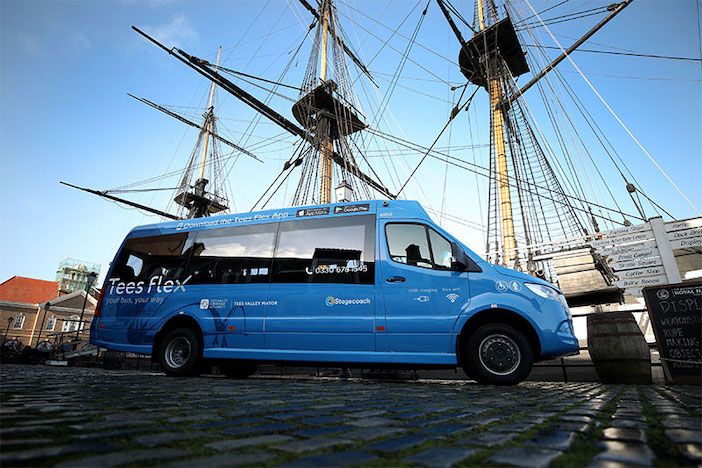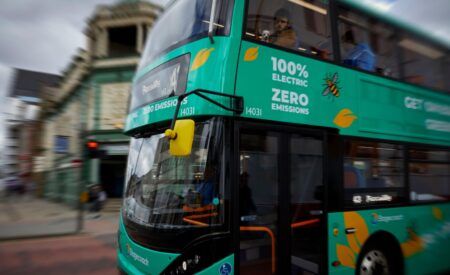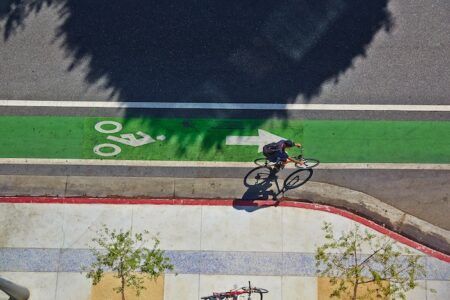A growing number of services throughout the United Kingdom are proving the concept of digital demand-responsive transport (DDRT) in urban, rural, and nationwide contexts.
As the UK looks to ‘level up’ public transport and combat falling bus ridership, technology-augmented DRT – delivered in partnership with local authorities and operators – has a critical role to play in delivering high-quality, low-cost services in areas where fixed-route bus service is infrequent or financially unfeasible. If properly connected to fixed-route bus and train services with journey-planning technology, DDRT can even help draw new riders into the broader transport network.
Here, we highlight three DDRT-powered services — all partnerships between transport authorities or operators and transport software company Via — that are each making tangible economic, social, and environmental impacts on their communities.
While MK Connect in Milton Keynes demonstrates how DDRT can supplement fixed-route networks in an urban context, Tees Flex, in the Tees Valley region of the North-East, connects residents of smaller villages to essential jobs and services. Meanwhile, the nationwide fflecsi program in Wales includes multiple urban, rural, and suburban zones, each with their own characteristics, service goals, and operating practices.
Nationwide in Wales
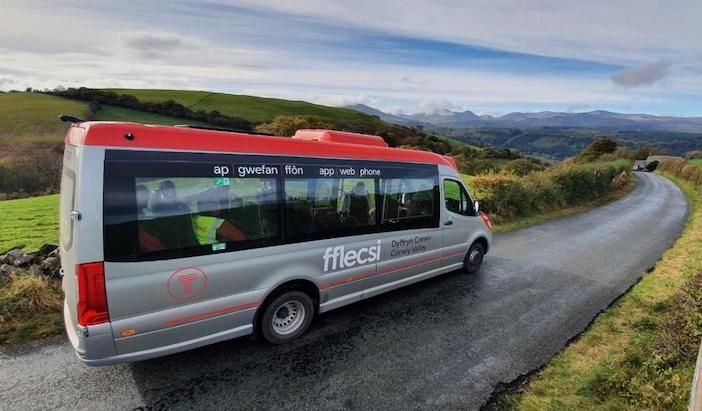
fflecsi is a country-wide demand-responsive bus service providing flexible transport options for residents of rural, suburban, and urban communities in Wales. Under the administration of Transport for Wales, the program leverages software to support 11 discrete service zones throughout the country, each implemented in collaboration with local authorities and operators.
fflecsi is more than a transport network: it is a commercial and digital infrastructure facilitating the implementation of bespoke, locally-targeted solutions nationwide. Each service zone has its own goals and its own design, with on-demand, pre-booked, and hybrid service models connecting passengers to jobs, appointments, and fixed-route transport options.
fflecsi is designed to evolve and expand. When the program launched in May 2020, it was a single zone with a sharp focus on COVID-19 emergency transport. Now, with the digital infrastructure in place, new zones can launch within just a few weeks.
Across the program, fflecsi delivers approximately 5,000 rides per week and, according to a January 2021 survey, fflecsi is fulfilling its mission to expand public transport coverage. Seventy-three percent of fflecsi users reported that they were able to reduce their private car usage.
“This innovative service is an important part of Transport for Wales and the Welsh Government’s vision to reduce car usage and promote greener forms of travel, while also supporting the local economy and ensuring access to public transport”
James Price, CEO, Transport for Wales
Total service zone size: 1200 sq km (across 11 zones)
Vehicle count: 26
Average wait time: 15 minutes
City solutions in Milton Keynes 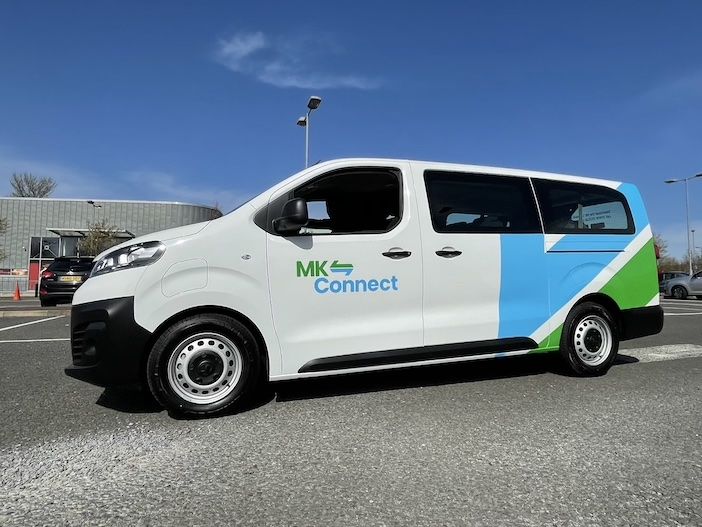
Though DRT has long been a feature of rural transport — and, indeed, is supported by the Rural Mobility Fund — its relevance in urban centres has historically been underestimated. Milton Keynes Council’s MK Connect demonstrates the viability of DRT in an urban environment by providing a high-quality, cost-effective replacement for fixed routes with low patronage. The service offers a roadmap for cities throughout the UK that are looking to optimise their bus networks in an increasingly constrained funding environment.
With MK Connect, residents have access to demand-responsive service that is fully integrated with the commercial bus network. If a fixed-route service is the most efficient option for a passenger’s proposed journey, they are directed toward the nearest bus stop. Only if fixed lines are not capable of meeting their trip request will a DRT option be shown.
MK Connect demonstrates that with smart service design, DRT services can complement, rather than compete with, high-capacity commercial bus routes. DRT can also be a cost-effective option for authorities and customers alike: MK Connect is expected to save the council at least £1m annually when compared to the subsidised fixed-route services it has replaced. Even better, the council is achieving these cost-savings while simultaneously pursuing carbon-neutrality through the introduction of a majority-electric fleet.
“MK Connect is proving to be an increasingly popular way for people to get around the city. We’re pleased with how the new service has integrated with existing commercial routes, so only journeys that can no longer be made by bus are being transferred to MK Connect. As a frequent user of the service myself, I know MK Connect is providing a much more efficient and cleaner way to travel for our residents”
Jenny Wilson-Marklew, Milton Keynes Council
Service zone size: 309 sq km
Vehicle count: 30, with at least 50% EVs
Average wait time: 30 minutes
Rural service in Tees Valley
In a more traditional setting for DRT, Tees Flex has set a new standard for flexible, high-quality rural mobility in the industrial region of Tees Valley. Tees Flex offers service in three principal areas, though riders may request trips to select destinations, like train stations or hospitals, outside the main service zones.
Delivered by Stagecoach, the UK’s largest bus and coach operator, with advanced booking and routing software, Tees Flex has quickly proven to be a success. The service provides roughly 1,500 journeys per week to a user base of nearly 10,000, indicating wide adoption by the local community. Another compelling data point shows that 62% of passengers reported using their private cars less frequently, pointing to the power DRT wields to reduce reliance on single-occupancy vehicles and thus curb emissions.
While accessible vehicles and multiple convenient booking modes (mobile app, phone call, or web interface) make Tees Flex an inclusive transport choice for passengers, the flexibility of the service’s underlying software makes it a future-proofed mode for Stagecoach and the local authority. For example, in February 2021, the service added the Darlington Arena mass vaccination site to its zone to help fulfill an urgent community need.
“It’s more important than ever that people can access health services, get to the supermarket or to the local jobs and training opportunities we are creating for local people in Teesside, Darlington and Hartlepool. Now they can do all that with a touch of a button – with more locations making the service even more useful and convenient for everyone in our region”
Ben Houchen, Mayor of Tees Valley
Service zone size: 400 sq km
Vehicle count: 9
Average wait time: 22 minutes
Images: AdobeStock, Via



